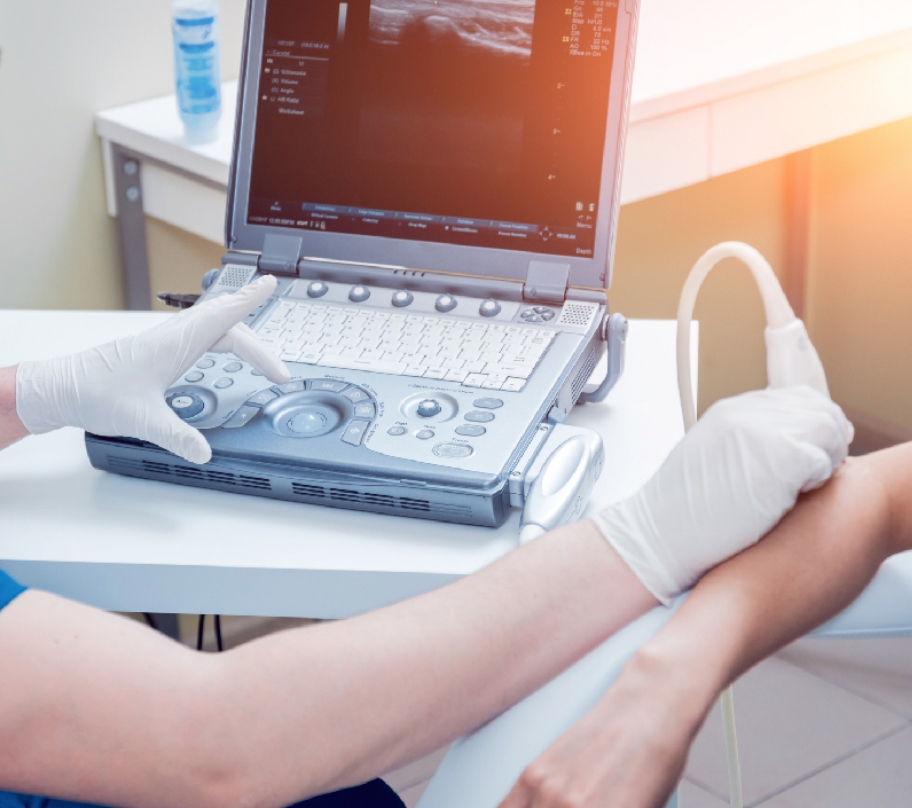The Importance of
Guided Injections
Injections need to be administered at an exact location in order to have a high success rate for treatment. The conventional palpation guided method is extremely inaccurate, and is therefore referred to as “blind”. These injections are solely based on experience and knowledge. Unfortunately, even a very experienced physician will always be less accurate and their failure rate will remain high.
This is the reason why fluoroscopy & ultrasound guided injections are the methods we recommend. These methods are necessary to ensure the injection is administered at the exact location. With a correct injection, physicians can make a more accurate diagnosis and better understand where the pain originates.
About
Ultrasound Guided Injections
An ultrasound-guided medication injection utilizes ultrasound technology to give our physicians a precise view of the area that is causing pain. We then use this ultrasound image to guide the injection needle into the problem area.
It is particularly recommended for areas that are deeper within the body and not as close to the surface of the skin as other areas. It is more difficult to perform on these areas, and the ultrasound guidance comes in extremely useful in order to provide the best treatment possible.
Ultrasound guided injections allow physicians to administer medication with upmost accuracy.
Pain conditions treated with this method include:
Rheumatoid arthritis
Osteoarthritis
Sports Injury
Inflamed Joints and Tendons
Tendonitis
Joint Pain
Muscle Pain
Synovitis

FAQ'S
- Please shower to make sure the area being injected is clean. This decreases risk of injection.
- You may eat your normal diet before and after the procedure.
During a ultrasound-guided injection, we place a sterile gel onto your skin where the pain is located.
We then place the ultrasound probe near the source of the inflammation. The ultrasound signals are translated into an image projected onto a screen.
From there we insert the needle precisely into the area needed, using the ultrasound images as a guide.
Once in place, we inject the medication.
- Greater accuracy
- Minimal procedure time
- Safe procedure
- No radiation involved
- Reduce procedural pain
The risks associated with these procedures are the same as any type of injection; bleeding, damage to surrounding structures and infection.
The procedures take between 5-30 minutes.
It’s important to rest the joint where the injection was administered. You should minimize activity for the first 24 to 48 hours.
Injections can take a few days to have a noticeable effect and up to 7-10 days for the full effect.
The steroid lasts for up to six weeks but the effects of the injection can sometimes last much longer. Your doctor will normally arrange a follow-up appointment with you after your injection.

About
Fluoroscopy
Fluoroscopy is similar to an X-ray movie on one specific area of the body. It provides real-time imagery which allows the physician to locate the injection site with upmost accuracy and ensures the medication is correctly injected for pain relief. The physician can direct needles with more precision when performing a procedure or administering treatment. Fluoroscopy can be used on different parts of the body, but is most commonly used for spine interventions and spinal injections.
Pain conditions treated with this method include:
Spine pain
Knee pain
Hip Arthritis
Lumbar Disc Herniation
Sciatica
Piriformis Syndrome
Shoulder Arthritis
Rotator Cuff Issues
FAQ'S
- Please shower to make sure the area being injected is clean. This decreases risk of injection.
- You may eat your normal diet before and after the procedure.
During fluoroscopy, the patient is positioned on an examination table, and with the targeted area of the body exposed. A special X-ray scanner captures images of the targeted area to determined the area of injection.
Fluoroscopy is the only type of imaging procedure that captures real-time moving images of the body's internal organs. It enables our doctors to get a visual image of areas of the body that cannot be seen from an X-ray alone. This allows us to perform injections that require precision.
There are small risks associated with this injection, which you should be aware of before you proceed. The radiologist doing your procedure will talk you through this when you arrive.
The procedures take between 5-30 minutes.
It’s important to rest the joint where the injection was administered. You should minimize activity for the first 24 to 48 hours.
Injections can take a few days to have a noticeable effect and up to 7-10 days for the full effect.
The steroid lasts for up to six weeks but the effects of the injection can sometimes last much longer. Your doctor will normally arrange a follow-up appointment with you after your injection.
Why Choose Precision Care Centre?

Fully Covered by OHIP
If you are referred by your Family Physician and are a resident of Ontario, our services are covered by OHIP.

Short Wait Time
Our experience enables us to diagnose and begin treatment sooner, with greater precision.

Top Specialists
Highly qualified and experienced team of specialists with additional training in pain management and sports medicine.

Best Facilities
We deliver updated, modernized and state of the art equipment to treat pain.

